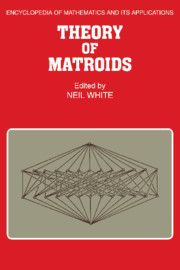Book contents
- Frontmatter
- Contents
- List of Contributors
- Series Editor's Statement
- Foreword
- Preface
- Chapter 1 Examples and Basic Concepts
- Chapter 2 Axiom Systems
- Chapter 3 Lattices
- Chapter 4 Basis-Exchange Properties
- Chapter 5 Orthogonality
- Chapter 6 Graphs and Series-Parallel Networks
- Chapter 7 Constructions
- Chapter 8 Strong Maps
- Chapter 9 Weak Maps
- Chapter 10 Semimodular Functions
- Appendix of Matroid Cryptomorphisms
- Index
- ENCYCLOPEDIA OF MATHEMATICS AND ITS APPLICATIONS
Foreword
Published online by Cambridge University Press: 05 May 2010
- Frontmatter
- Contents
- List of Contributors
- Series Editor's Statement
- Foreword
- Preface
- Chapter 1 Examples and Basic Concepts
- Chapter 2 Axiom Systems
- Chapter 3 Lattices
- Chapter 4 Basis-Exchange Properties
- Chapter 5 Orthogonality
- Chapter 6 Graphs and Series-Parallel Networks
- Chapter 7 Constructions
- Chapter 8 Strong Maps
- Chapter 9 Weak Maps
- Chapter 10 Semimodular Functions
- Appendix of Matroid Cryptomorphisms
- Index
- ENCYCLOPEDIA OF MATHEMATICS AND ITS APPLICATIONS
Summary
It is a rare event that mathematicians, cozily ensconced in the world of established theories, should extract, by dint of pioneering work, some new gem that later generations will spend decades polishing and refining. The hard-won theory of matroids is one such instance. Rich in connections with mathematics, pure and applied, deeply rooted in the utmost reaches of combinatorial thinking, strongly motivated by the toughest combinatorial problems of our day, this theory has emerged as the proving ground of the idea that combinatorics, too, can yield to the power of systematic thinking.
A superficial look at the theory of matroids might lead to the conclusion that it is largely an abstraction of linear algebra. It was noticed quite some time ago that the elementary theory of linear dependence can be developed from the MacLane-Steinitz exchange axiom. In fact, this abstraction was first exploited in the theory of transcendence degrees of fields. But such a conclusion would be unwarranted. What the theory of matroids provides is a variety of cryptomorphic axiomatic approaches, each of which corresponds to a genuinely new way of looking at linear algebra. Linear algebraists might not easily be led to these axiomatic approaches. The axiomatization of matroids by the notion of a minimal dependent set, for example, leads to the deeper matching theorems for sets of vectors. The axiomatization by the notion of rank leads to the classification of projectively invariant constructions of new matroids from old.
- Type
- Chapter
- Information
- Theory of Matroids , pp. xiii - xivPublisher: Cambridge University PressPrint publication year: 1986



